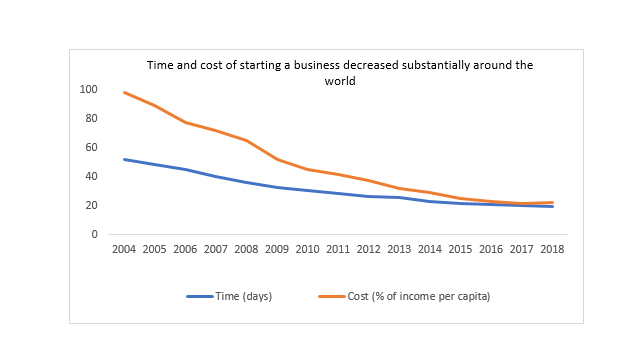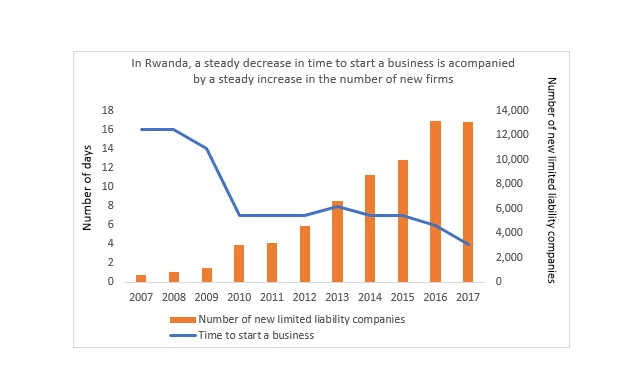With more jobs and competitiveness in mind, many economies worldwide have simplified their business start-up rules and regulations over recent years. Since the first Doing Business report was launched 15 years ago in 2003, a total of 626 national reforms that reduced the time and the costs of starting a business were recorded globally.
Although not all economies have progressed at the same rate, a growing number, with burdensome regulations, have gradually adopted best practices. Studies find that simple incorporation procedures stimulate firm creation. Divanbeigi and Ramalho in their paper “Business Regulations and Growth” showed that better entry and exit regulations were linked with higher business entry. In another paper, “The Impact of the Business Environment on the Business Creation Process”, Klapper, Lewin and Quesada Delgado found that a quick, efficient, and cost-effective business registration process was critical for fostering formal sector entrepreneurship. Another economy-specific case was researched by Bruhn and Miriam in “License to Sell: The Effect of Business Registration Reform on Entrepreneurial Activity in Mexico” – showing that improving business registration regulation was associated with an increase of registered businesses, including formalization of previously unregistered ventures.
Governments adopted many different policies to simplify business incorporation. Setting up a one-stop shop that brings together the agencies involved, such as a business registry, tax authorities and social security, was among the most effective policies. Since 2003, about 80 reforms were put in place around the globe to create or improve a one-stop shop. In these economies, entrepreneurs are no longer required to visit several agencies to register a business.
Another important tool employed by governments to facilitate business start-ups was the introduction of online services and the use of technology. Italy was among the first economies launching an online platform for business registration recorded by Doing Business in 2004. Within 15 years, 77 economies took similar initiatives to digitize some or all procedures of business registration, making it possible to complete them from anywhere.
As a result of all these reforms, the time and cost to register and formally operate a business significantly reduced globally. The time to start a new small or medium business globally has more than halved over the last 15 years. In 2003, it took entrepreneurs worldwide 52 days on average, and it now takes only 20 days. In addition, in 65 economies, entrepreneurs can now complete at least one business incorporation procedure online, compared with only nine in 2003. Starting a business is not only faster, but also significantly less costly than 15 years ago. In 2003, the cost was 101 percent of the income per capita of economies globally, today it is 22 percent on average.
Source: Doing Business database.
Note: Data include the number of economies covered by Doing Business for each specific year.
By region, economies in Europe and Central Asia reduced the time to start a business most. It now takes only 10.5 days to register a new business in the region, four time faster than in 2003 (43 days). Sub-Saharan Africa has been focusing on reducing the cost of business incorporation, decreasing the cost by more than seven times during the last 15 years. In 2003, entrepreneurs in the region had to spend on average 305 percent of the income per capita to start a business, today they only need to spend 42 percent of income per capita.
One of the main questions is that whether these substantial improvements in business incorporation promoted the creation of more firms. Several economies that reformed their business start-up process experienced an increase in the number of newly created limited liability companies. One of these economies was Rwanda, which undertook the highest number of business reforms globally since the launch of the first Doing Business report in 2003.
Sources: Doing Business database, Entrepreneurship database.
Rwanda carried out five key reforms in the area of Starting a Business over the past 10 years. It simplified the business start-up process in Kigali by eliminating the notarization requirement, introducing standardized memoranda of association, putting publication online, and consolidating several processes such as name-checking, registration fee payment, tax registration, company registration. Rwanda also opened an online registration one-stop shop and reduced the business incorporation fees. Nowadays, entrepreneurs only have the option to register their company online at no cost at the business registry. In 10 years, the time to start a business was divided by 4 while the number of new limited liability companies was multiplied by 23.
Like Rwanda, many other economies simplified their business start-up process. Starting a business became easier than ever over the past 15 years. This process of simplification is uninterrupted and is now resorting to new technological and innovative solutions. But the objective remains the same: to make the life of entrepreneurs easier in their efforts to create jobs, a dynamic private sector, and ultimately more growth and opportunity at the community and national levels.






Join the Conversation